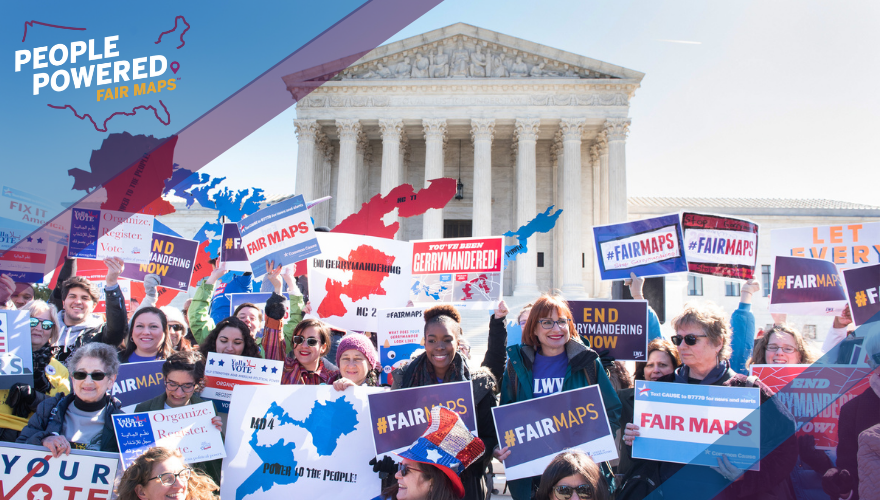
Common Cause v. Raffensperger
Case Summary
The League of Women Voters of Georgia, along with Common Cause, Dr. Ursula Thomas, Jasmine Bowles, and Dr. H. Benjamin Williams, filed suit in federal court against Brad Raffensperger, the Georgia Secretary of State, and other members of the Georgia legislature asserting three Congressional districts in metropolitan Atlanta were racially gerrymandered.
In January of 2022, the League of Women Voters of Georgia (LWV Georgia), along with Common Cause, Dr. Ursula Thomas, Jasmine Bowles, and Dr. H. Benjamin Williams, challenged Georgia’s sixth, thirteenth, and fourteenth congressional districts in metropolitan Atlanta as unconstitutional racial gerrymanders. The complaint argues that the political power of Black and voters of color was diminished in the challenged districts by two means: packing and cracking. 'Packing' of voters of color occurs when they are deliberately concentrated in certain districts to reduce their power in surrounding areas. 'Cracking' occurs when voters of color are divided among multiple districts, ensuring their numbers are too low to elect candidates of their choice in each district.
LWV Georgia and its partners argued that the redistricting plan, titled S.B. 2EX, violates the Equal Protection Clause of the Fourteenth Amendment by diluting the votes of communities of color. The plaintiffs requested: (1) a declaration that the districts at issue were racially gerrymandered in violation of the Fourteenth Amendment; (2) a court order forbidding any elections in the challenged districts and surrounding districts needed to remedy their unconstitutionality; (3) an order requiring Georgia to draw non-racially gerrymandered districts compliant with Section 2 of the Voting Rights Act; and (4) if necessary, implement an interim redistricting plan for Georgia's congressional seats.
Litigation is currently ongoing. Plaintiffs are represented by the Southern Poverty Law Center and Dechert LLP.
LWV Timeline
LWV Georgia files federal lawsuit
LWV Georgia and co-plaintiffs file a complaint in federal court, arguing Georgia's sixth, thirteenth, and fourteenth congressional districts are racially gerrymandered in violation of the Fourteenth Amendment of the United States constitution.
Case consolidated with Georgia State Conference NAACP v. Georgia
The court consolidates the League's case with a lawsuit brought by the Georgia NAACP, which challenges several Congressional and state legislative districts.
Defendant files motion for summary judgment
Defendant Secretary of State Brad Raffensperger files a motion for summary judgment, arguing the organizational plaintiffs, including the League, did not have standing to sue. The motion also asserts the plaintiffs failed to show evidence of racially discriminatory intent or racial gerrymandering, meaning they could not prevail on their Equal Protection Clause claim as a matter of law.
Plaintiffs file opposition to summary judgment
Plaintiffs file their opposition to summary judgment, arguing (1) the organizational plaintiffs satisfied standing in two ways; (2) that racial gerrymandering was evidenced by the predominance of race over traditional redistricting principles in the map drawing process and (3) the challenged districts' boundaries could not be explained by race-neutral, partisan motivations.
Court issues preliminary order denying summary judgment
The court issues a preliminary order informing defendants their motion for summary judgment is denied, ahead of the trial scheduled for November 13, 2023.
Court issues opinion denying summary judgment
The three-judge panel issues its full opinion denying the defendant's motion for summary judgment. The opinion finds that the League and Common Cause have associational standing to sue, and that material disputes of fact remain on whether the Congressional districts and state legislative districts at issue were racially gerrymandered.
Congressional districts struck down in separate ruling
In a separate ruling on three cases challenging Georgia's state legislative and Congressional maps, the three-judge panel strikes down several legislative and Congressional districts for violating of Section 2 of the Voting Rights Act. The panel orders a new majority African American Congressional district be drawn in the western Atlanta metro area.
Governor Brian Kemp calls special session of Georgia legislature
In response to the panel's ruling, Governor Brian Kemp calls a special session of the Georgia legislature to redraw the state's legislative and Congressional districts.
Defendants decide not to seek stay pending appeal
Defendants decide they will not seek a stay pending appeal of the rulings striking down the challenged Congressional and state legislative maps for violating Section 2 of the Voting Rights Act. This allows the special session to redraw the Congressional maps challenged by the League and its co-plaintiffs.
Court stays case
The court orders the case to be stayed until appeals of the separate opinion striking down several of Georgia's legislative and Congressional districts are resolved.
Georgia legislature passes new Congressional and state legislative districts
The Georgia legislature enacts new Congressional, state senate, and state house districts. The new maps largely maintain the current partisan balance of the Congressional delegation and state senate, while making two state house districts more Democratic-leaning.
Plaintiffs object to remedial Congressional maps
Plaintiffs object to the remedial Congressional map, stating it violated the court's previous order and Section 2 of the Voting Rights Act by (1) moving Black voters from outside the districts struck down for vote dilution into a new majority-Black district; (2) failing to address the diluted votes of 50,000 Black voters within the enjoined districts and (3) dismantling an existing district where people of color were a majority without being required to do so.
Court adopts remedial Congressional maps
The court overrules plaintiffs' objections to the remedial Congressional maps, ruling the legislature was not barred from including Black voters from outside the districts struck down when drawing remedial maps. The ruling also states the issue of whether Section 2 forbade dismantling Congressional District 7, a majority-people of color district, would require a new lawsuit to adjudicate.
Court issues order staying case pending appeal
The court issues an order staying the case until appeals in several other cases against the Congressional districts are resolved by the Eleventh Circuit.





